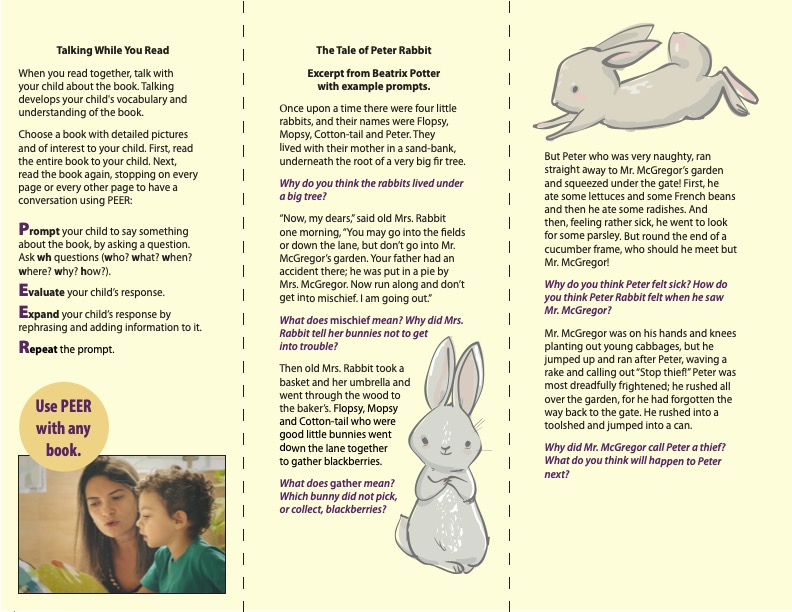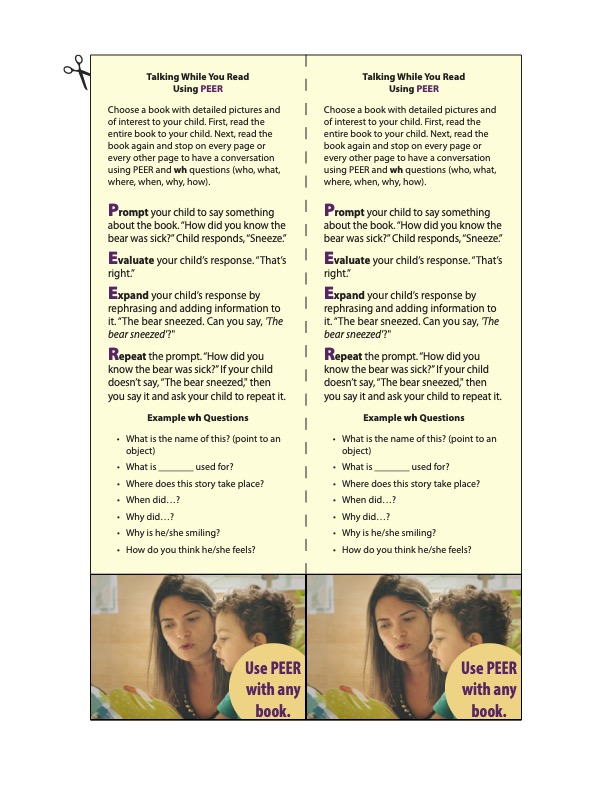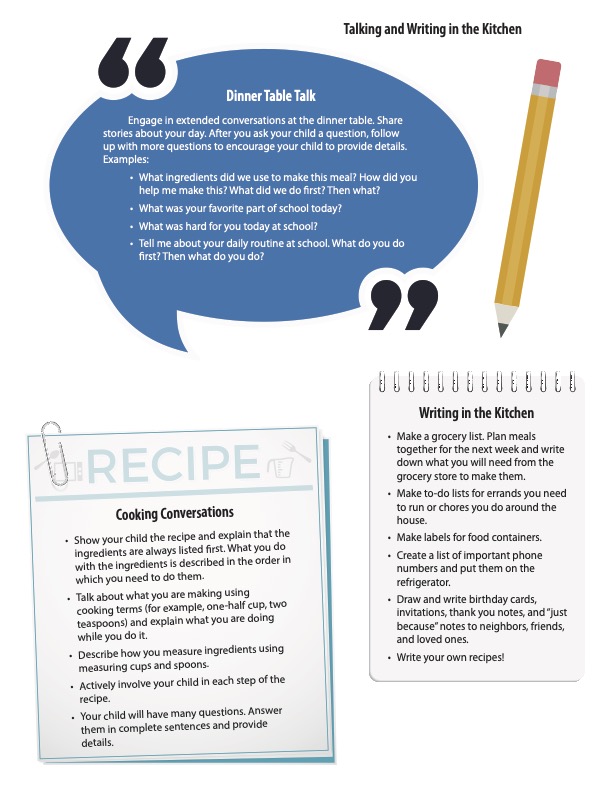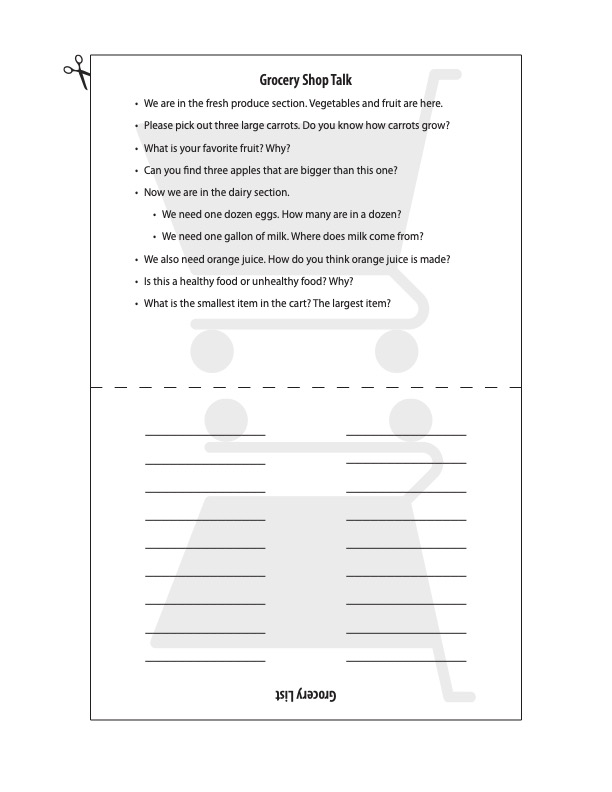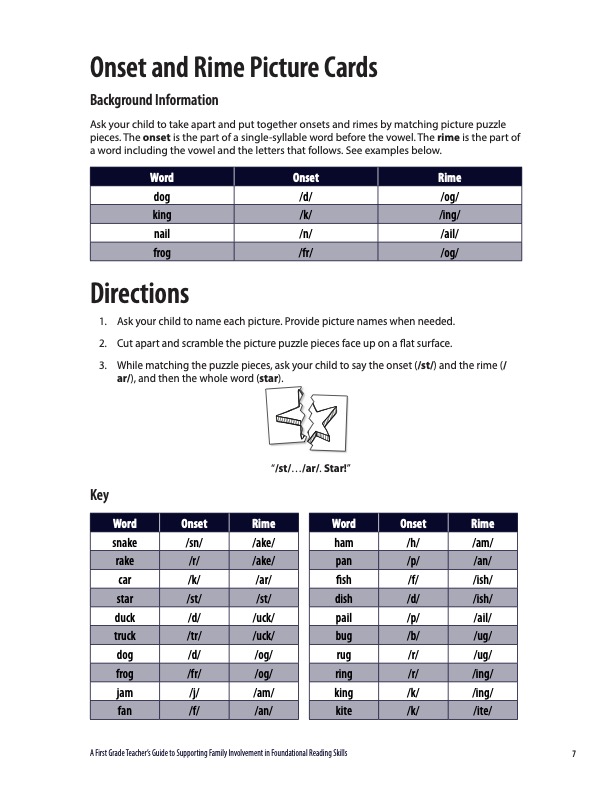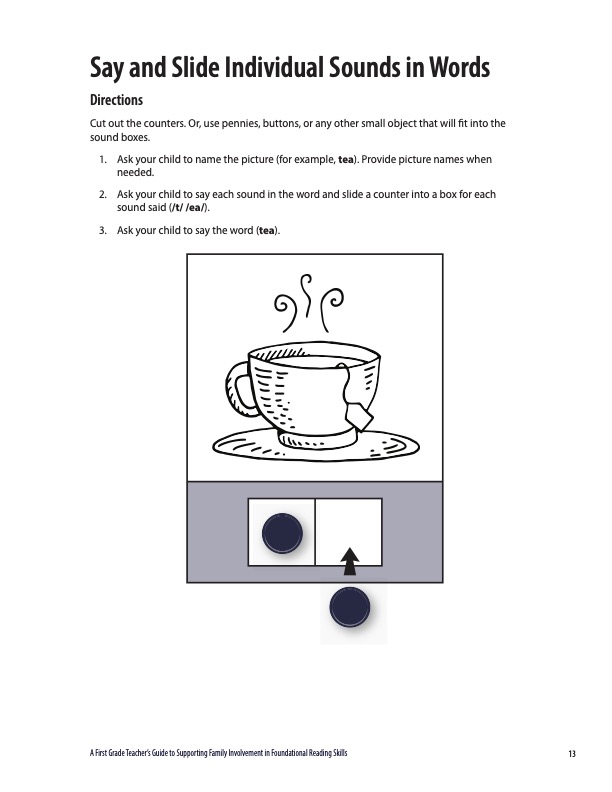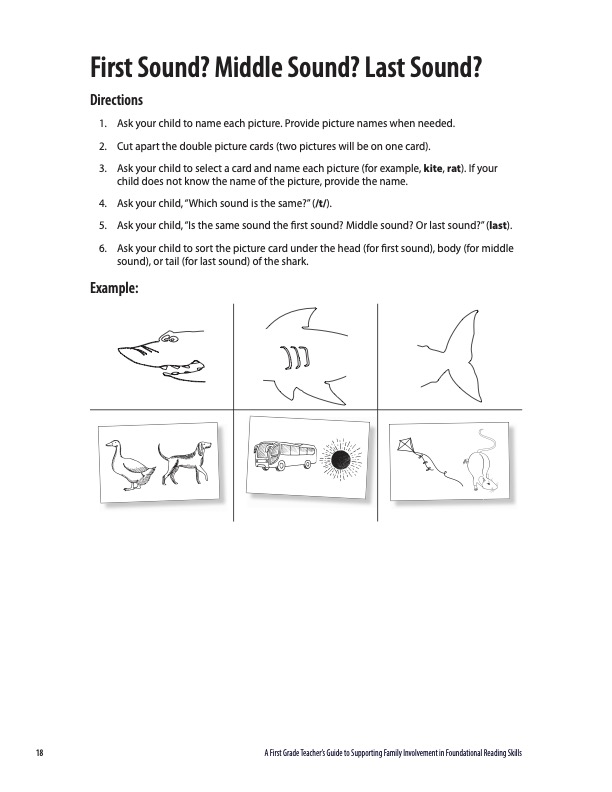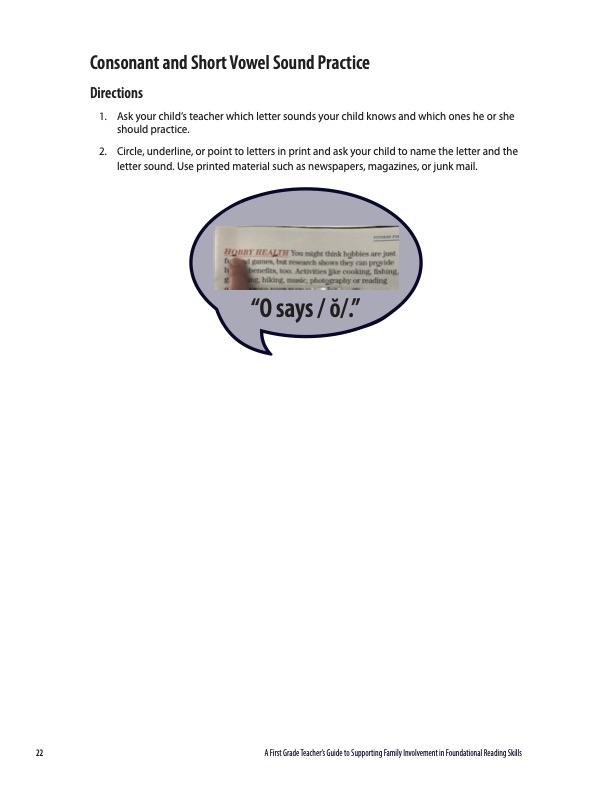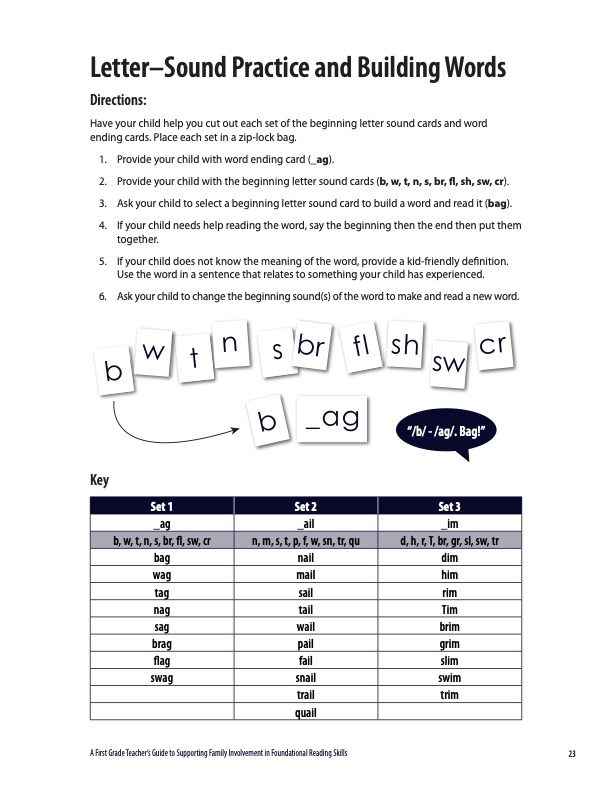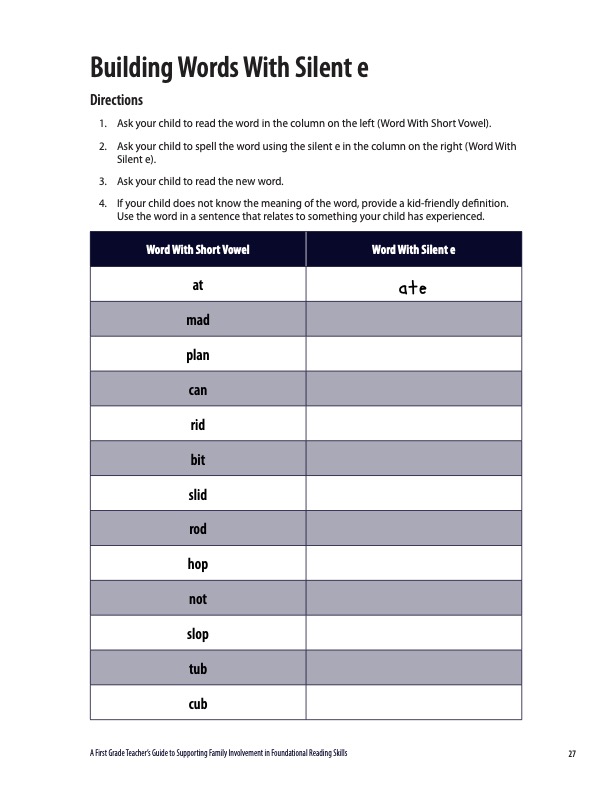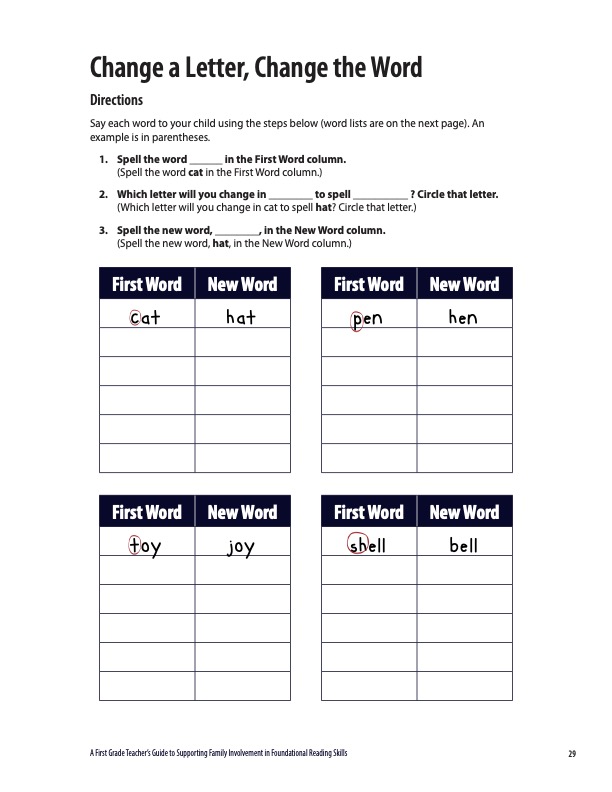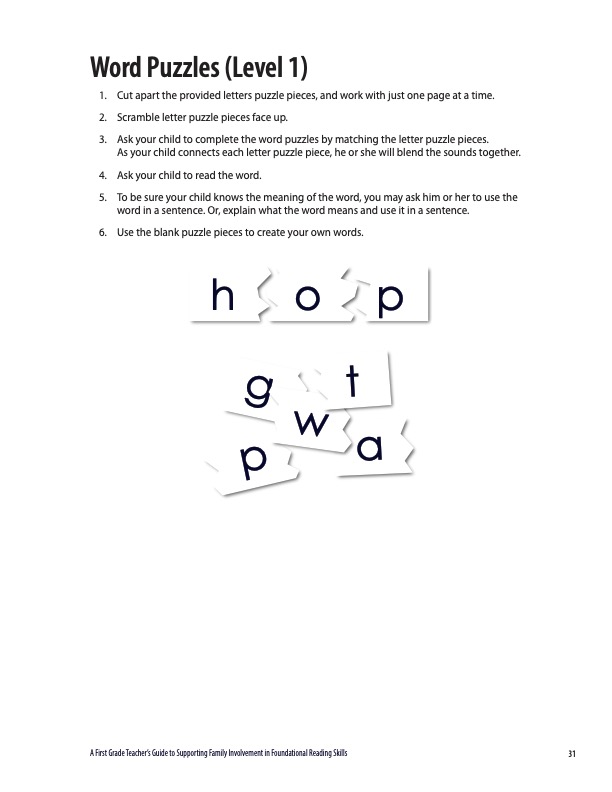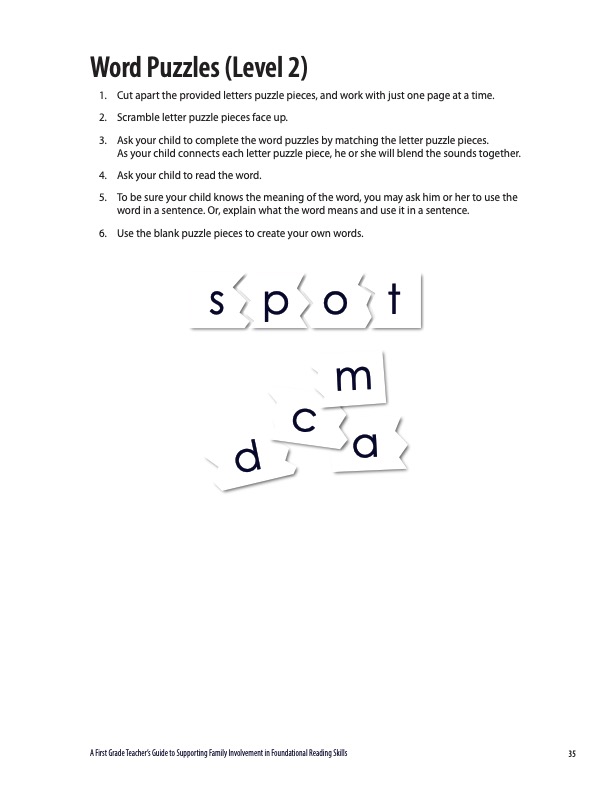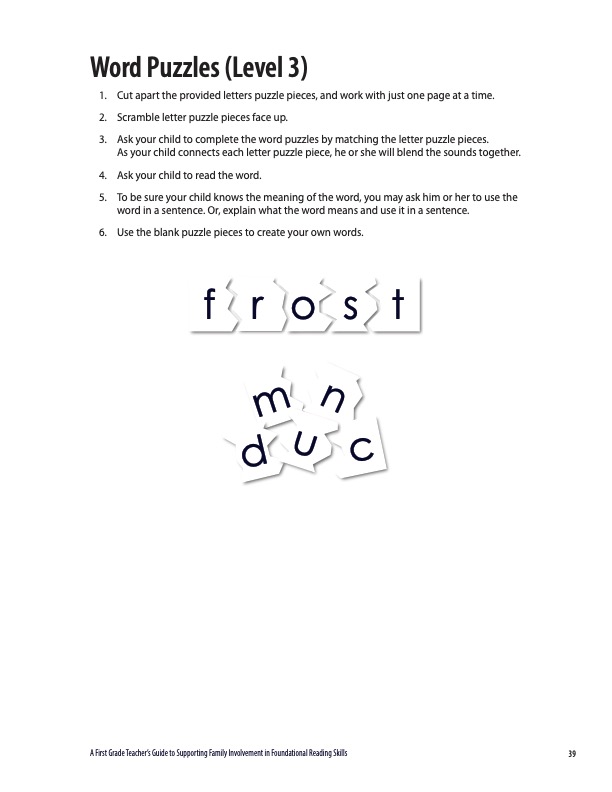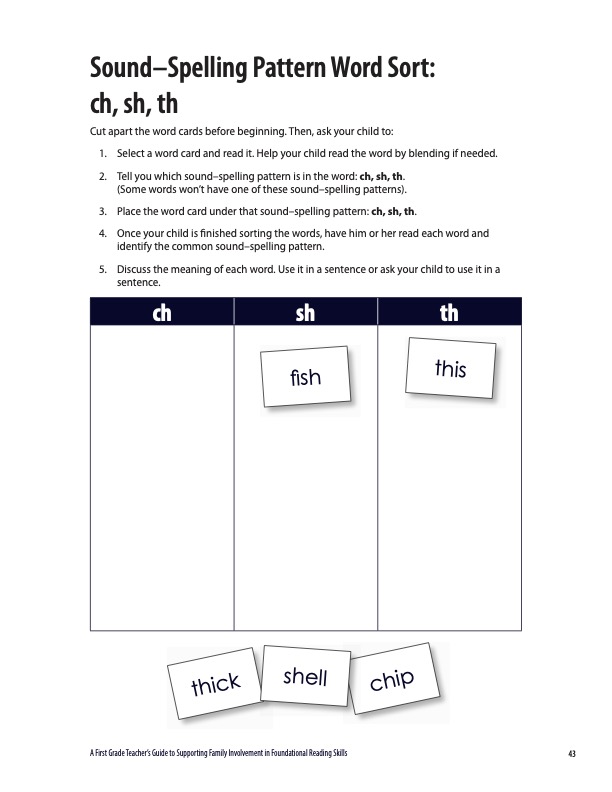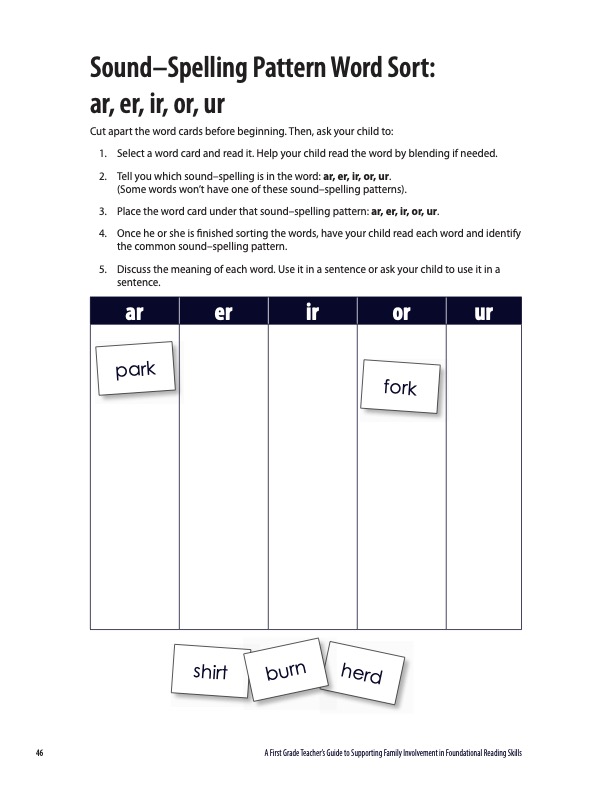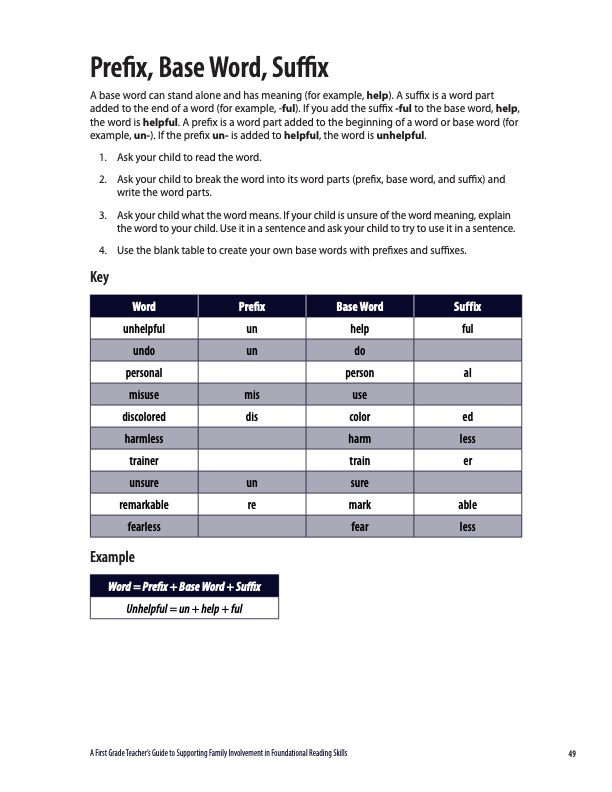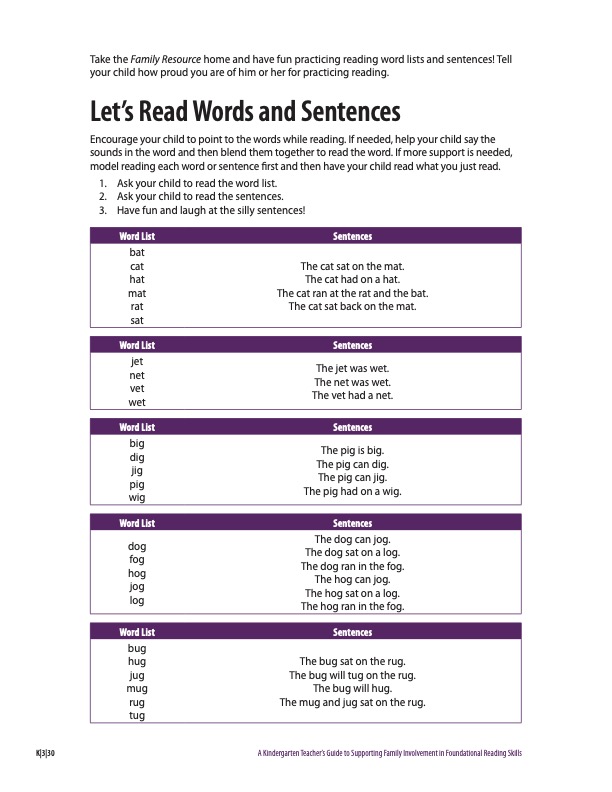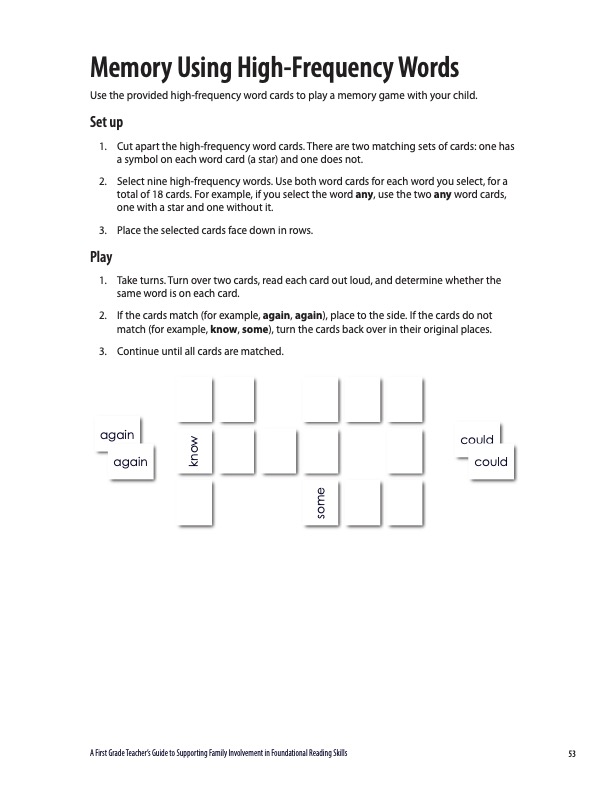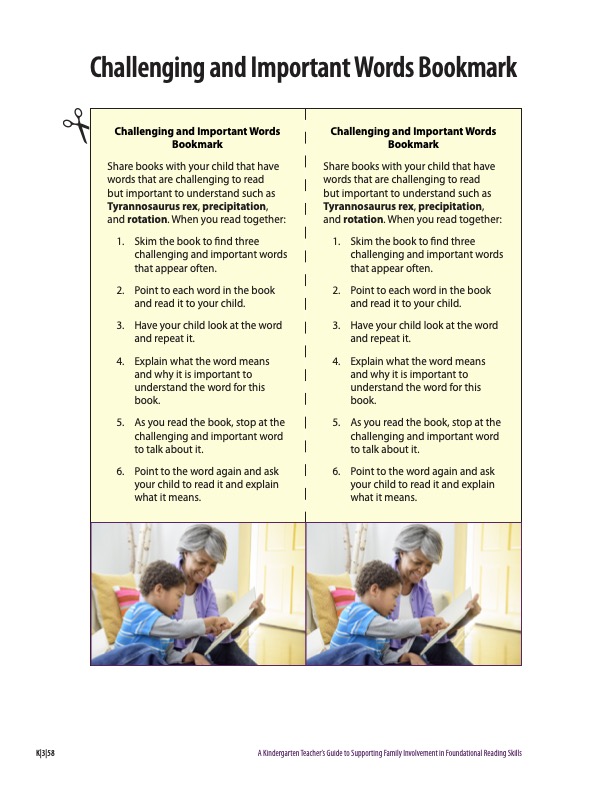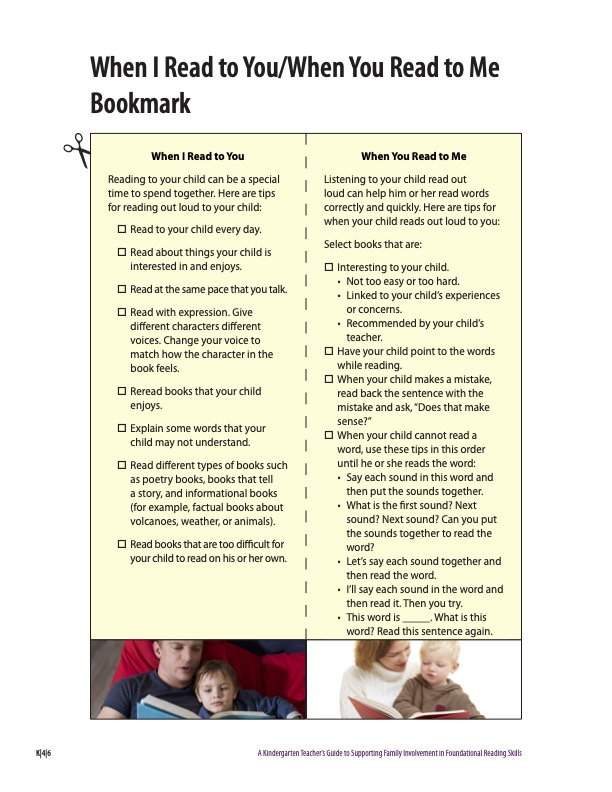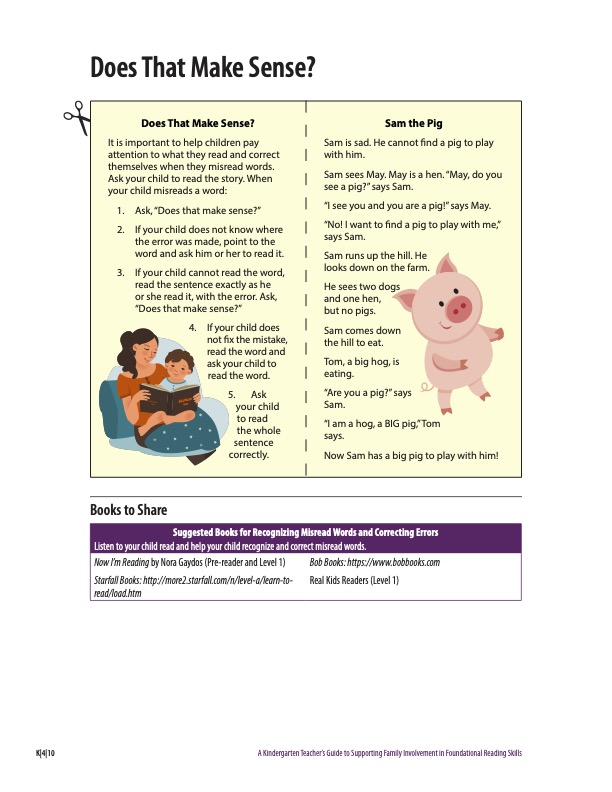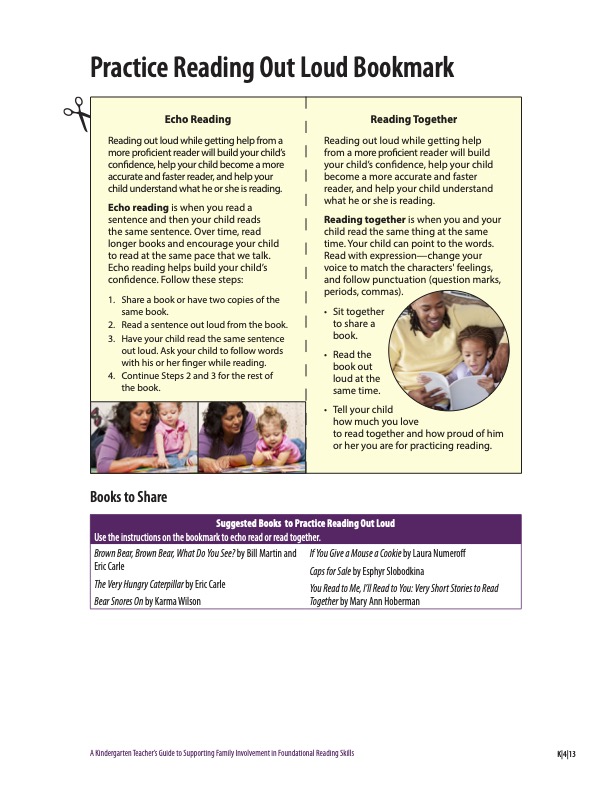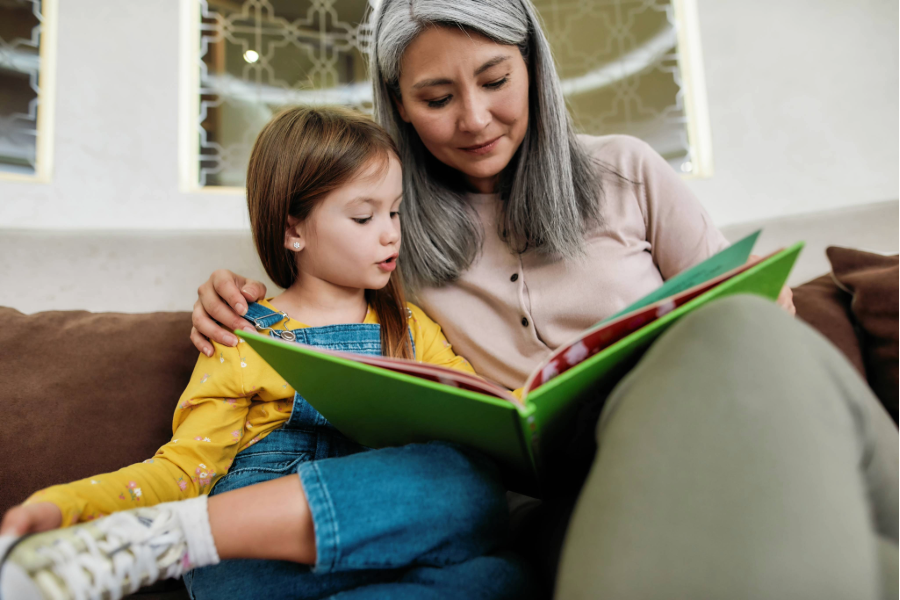
Learning to read begins at home through everyday parent-child interactions, long before children attend school. Your continued support of literacy development throughout elementary school positively affects your child's reading ability. We are pleased to provide these Family Activities with easy-to-follow instructions to help your child practice foundational reading skills. We invite you to view the short Family Videos for tips on how to use the activities to help your child grow as a reader. Using the Family Activities at home can help your child develop language, link sounds to letters, blend letters and word parts to read and write words, and read for understanding.
First Grade: Developing Language
Talking While You Read
Expose your child to the language that is common in books and in schools.
Having a conversation about a book will develop your child's vocabulary and knowledge about the topic of that book. Whether you are reading a fairy tale, a picture book, an informational book, or any other text, you can engage in a discussion as you enjoy reading together.
The best books to use have detailed pictures and are about topics that are interesting to your child. You can use books from your home or borrow a book from your child's classroom library, school library, or the public library. Also, keep in mind that you can access books on laptop computers, tablets, digital reading devices, and smartphones. Websites such as Project Gutenberg provide free access to books and mobile formats especially for smartphones. Don't forget to look through your phone's app store for free apps containing books for children.
To engage your child in conversation, you can use a tool called PEER: Prompt, Evaluate, Expand, and Repeat. See the Talking While You Read tri-fold and Bookmark for an example of how to use PEER.
Talking While You Read (The Legend of Spookley the Square Pumpkin)
Key Points About the Video
- Mom continually uses the word round to help her daughter build vocabulary.
- Mom restates her daughter's answers in complete sentences to model oral language skills.
- Mom uses the Talking While You Read Bookmark to remind herself of kinds of questions to ask
Talking While You Read Trifold
The Talking While You Read Trifold includes an overview of how to use PEER. There is also a story with questions placed where they are most helpful to prompt your child. Remember to read the story through one time first with your child. On the second read, use PEER as you ask each question.
Talking While You Read Bookmark
You can use the Talking While You Read Bookmark to engage your child in conversation while reading any book.
Supporting Oral Language and Vocabulary Development
Oral language is the way we communicate with others through speaking and listening. Vocabulary knowledge is a crucial part of oral language and includes understanding the meaning of words, how to use them, and how to pronounce them. Speaking and listening to your child every day about books and his or her experiences will help your child expand his or her vocabulary. Children with strong oral language skills and larger vocabularies typically become better readers. The best ways to give your child a strong foundation for learning to read are to read to, talk to, and listen to your child every day. Talk about people you know, places you go, and experiences you have together. Writing with your child also helps with oral language development.
Ask questions that require more than a yes or no answer. For example, instead of asking, "Did you have a good day?" ask, "What was your favorite part of school today?" Continue to ask questions about your child's response. If the answer was "Recess," ask, "Who did you play with?" "What did you do?" "How do you play that game?"
When you speak with your child, model speaking in complete sentences and provide details. For example, if your child points to a butterfly and says, "Butterfly!" say, "Yes, that is a monarch butterfly! Aren't her colorful wings beautiful?"
Language Development in the Kitchen
Key Points About the Video
- Children have fun baking brownies and planning to write a welcome note for new neighbors.
- Mom fully involves children in reading the recipe, gathering the ingredients, and making brownies while talking about what they are doing.
- Mom asks many questions and encourages both children to engage in the conversation.
Talking and Writing in the Kitchen
Use these questions, activities, and conversation starters to have fun while you talk and write in the kitchen.
Grocery Shop Talk
Use this resource to make a grocery list with your child. Ask your child questions and engage in conversations while you grocery shop together.
First Grade: Linking Sounds to Letters
Sounds in Words: Onset-Rime
Although speaking and listening may not seem related to learning to read, being aware of sounds in words is very important to reading. This awareness allows children to break apart words orally and use sounds to learn to read and write words. Children first need to become aware of sounds in words without relating those sounds to print. They demonstrate their knowledge using their speaking and listening skills.
You can help your child develop an awareness of sounds in spoken words. Singing silly songs and making up silly words or poems are ways to enhance your child's awareness of sounds. These skills are fun to practice because most children love to play with sounds in words. You can make up silly sentences where most of the words begin with the same sound: Leo the lion liked to lick a lot of lollipops!
There are many types of different sounds in words. For example, you can separate a word into its onset and rime. The onset is the part of a word before the vowel. The rime is the part of a word including the vowel and the string of letters that follows. In the word sun, /s/ is the onset and /un/ is the rime. In the word ring, /r/ is the onset and /ing/ is the rime. In the word stop, /st/ is the onset and /op/ is the rime.
Onset and Rime Picture Cards
Key Points About the Video
- Mom has her daughter review the names of the pictures before beginning the activity to make sure she knows the name of each picture.
- Mom offers positive encouragement throughout the activity (e.g. Good! You did that well! You said the onset and rime correctly! You got that, girl!).
Onset and Rime Picture Cards
Help your child take apart and put together the onset and rime of a spoken word.
Sounds in Words: Individual Sounds
Being able to separate and put together individual sounds in spoken words will help your child become a better reader and speller. If your child can hear the individual sounds in a word and put those sounds together, it will help him or her connect those sounds to letters when he or she reads and spells.
Say and Slide Individual Sounds in Words
Key Points About the Video
- Mom explains the activity and shows an example before she asks her daughter to try it.
- Mom is patient and shows her daughter how to do the task when she has a difficult time with the word paper.
- Mom tells her daughter that she worked hard and did a good job.
Say and Slide Individual Sounds in Words
Help your child separate and put together individual sounds of a spoken word.
Sounds in Words: First Sound, Middle Sound, Last Sound
Being able to separate and put together individual sounds in spoken words will help your child become a better reader and speller. If your child can hear the individual sounds in a word and put those sounds together, it will help him or her connect those sounds to letters when he or she reads and spells.
- The beginning sound of a word is the first sound you hear when you say the word. The first sound in soap is /s/.
- The middle sound of a word is the sound you hear in the middle when you say the word. The middle sound in soap is /o/.
- The ending sound of a word is the last sound you hear when you say the word. The last sound in soap is /p/.
First Sound? Middle Sound? Last Sound?
Key Points About the Video
- Mom asks her daughter to explain her answers.
- Mom has her daughter identify the sound that was the same in two words and tell whether it was the first, middle, or last sound in the words.
- Mom provides positive feedback throughout the activity.
First Sound? Middle Sound? Last Sound?
Help your child compare two spoken words, recognize their common sound, and identify the position of that common sound (first, middle, or last sound).
Letter Names and Letter Sounds
It is important for children to know letter names and letter sounds. Letter name knowledge is recognizing and naming letters. An example of recognizing letters is when you show a child the letters N, A, and S and ask which letter is S, the child points to the S. An example of naming letters is when a child looks at the letter M and orally names that letter.
Letter sound knowledge is demonstrated when a child can look at a letter in print and tell you the sound it represents. For example, if you point to the letter F and ask, "What sound does this letter make?" The child will say, "/f/."
The vowels are a, e, i, o, u. Each vowel has a short sound and a long sound. The short sound of each vowel is: a, /ă/; e, /ĕ/; i, /ĭ/; o, /ŏ/; u, /ŭ/. The long sound of each vowel is when the vowel says its name, a, e, i, o, u. The other letters of the alphabet are called consonants. For example, B, C, and D are consonants.
Consonant and Short Vowel Sound Practice Using Junk Mail
Key Points About the Video
- Mom explains the activity and provides an example for her son by saying the letter name and the letter–sound.
- Mom and son laugh and have fun with the activity.
Consonant and Short Vowel Sound Practice
Help your child practice identifying the sound for specific letters.
Books to Share
Suggested books to practice letter names and letter sounds. As you share the book, periodically point to a letter and ask your child to say the letter name and the letter sound.
- LMNO Peas by Keith Baker
- Click, Clack, Quackity-Quack: An Alphabetic Adventure by Doreen Cronin
- Eating the Alphabet by Lois Ehlert
- Alphabeasties and Other Amazing Types by Sharon Werner
- I Stink! by Kate and Jim McMullen
Sounds With Two or More Letters
When children know a few letter sounds, they are encouraged to blend them together to read and spell words. For example, fl says /fl/ as in flag and st says /st/ as in stop. If your child knows that s says /s/ and t says /t/, then they blend, or put together, those two sounds, /st/.
flag
stop
Sometimes, there are two letters that make one sound. For example, ch says /ch/ as in cheese and sh says /sh/ as in shop. Th has two different sounds. In the word that, th says /th/ where your vocal cords vibrate, and the sound is said out loud. In the word thin, th is whispered and your vocal cords do not vibrate.
cheese
shop
that
thin
Letter–Sound Practice and Building Words
Key Points About the Video
- Mom focuses on helping her son blend individual sounds together to spell and read the words.
- fl is a constant blend. It has two sounds, /f/ and /l/. This child knows each of these letter sounds, so is able to blend them together to spell the word flag.
- br is a constant blend. It has two sounds, /b/ and /r/. This child knows each of these letter sounds, so is able to blend them together to spell the word brag.
- Mom talked about the meanings of the words to help build vocabulary.
Letter–Sound Practice Building Words
Help your child practice changing the beginning sound or sounds of a word to build a new word.
Silent e Rule
An important step in learning to read is being able to connect how words are separated into individual sounds with knowledge of how letters relate to sounds. For example, when you are able to hear the individual sounds in the word sat, /s/ /ă/ /t/ and know that s represents /s/, a represents /ă/ and t represents /t/, you are linking letters to sounds. This is critical to understand and be able to do in the process of learning to read.
When we have a word like can and we add an e at the end, the word changes to cane. We call this the silent e rule. We do not say the sound of e; it is silent. The silent e also changes the vowel before it to a long vowel. A vowel is long when it says its letter name. Can has a short a, /ă/. But when we add the silent e to the end, /ă/ changes to /a/. Other examples include mad/made, rid/ride, hop/hope.
Spelling and Reading Words With Silent e
Key Points About the Video
- Mom offers positive encouragement (That's right! Excellent!).
- Mom has her son use words in a sentence to make sure he knows their meanings.
- Mom has her son read the list of words at the end of the activity for another opportunity to practice reading.
Building Words With Silent e
Help your child apply the silent e rule to writing and reading words.
Changing Letters in Words to Spell New Words
Word-changing activities can be used to help support your child's learning to read and spell. Word changing activities include using letters in which you know the sounds to build a word. Then, you change a letter or letters to change the word. Word changing can be fun for children and helps them become better spellers and readers.
Change a Letter, Change the Word
Key Points About the Video
- Caretaker is encouraging (Great! You got this!).
- Caretaker uses words in sentences and talks about the meanings of words.
- Caretaker is patient and breaks the task down into small steps (spell, write word, change letters, write new word).
Change a Letter, Change the Word
Help your child change a letter or letters in a given word to spell a new word.
First Grade: Blending Letters, Recognizing and Reading Words
Blending Words
Help your child blend letters to read words and recognize common word parts and words, and encourage them to write words.
Blending is the ability to put sounds together to read a word. To read a word, children must know the sounds the letters represent in the word and be able to blend those sounds to come up with the correct word. For example, after children know the letter sounds /f/ for f, /a/ for a, and /n/ for n, they learn to blend those sounds together to read the whole word. When they see the word fan, they are able to say, "/f/, /a/, /n/, fan." We call this, blending words.
There are three Family Activities for blending words, organized from easier to more difficult: Levels 1, 2, and 3.
Word Puzzles
Key Points About the Video
- The caretaker encourages the child to say each letter–sound that he selects to spell the word.
- As the child identifies letter–sounds and blends each word, the caretaker provides positive feedback.
- The caretaker makes sure the child knows what each word means by asking the child to use the word in a sentence or by explaining what the word means.
Word Puzzles (Level 1)
Help your child put together (blend) letter sounds and read three letter words (hop, pet, tub).
Word Puzzles (Level 2)
Help your child put together (blend) letter sounds and read four letter words (spot, flag, twig).
Word Puzzles (Level 3)
Help your child put together (blend) letter sounds and read five letter words (trunk, frost, spend).
Books to Share
These suggested books are made up of simple words that your child can practice blending with your help. While your child reads, support him or her in blending the sounds when needed. To blend, say each letter sound in the word in the order they appear and then read the whole word. For example, /s/, /ŭ/, /n/, sun. Maybe take turns reading a page to each other!
- The Cat in the Hat by Dr. Seuss
- One Fish, Two Fish, Red Fish, Blue Fish by Dr. Seuss
- Step Into Reading: http://www.stepintoreading.com
- I Can Read: https://www.icanread.com
Sound-Spelling Patterns
Sound-spelling patterns consist of letters that are often combined to make a specific sound. Look at these common sound-spelling patterns: ch, sh, th. These are called sound-spelling patterns because each time these letters are together, they make the same sound. For example, when c and h are together, it makes the sound, /ch/ as in chop. Look at the first list in the table below. Notice how each word has the same sound-spelling pattern, ch as in chop, hunch, chat. Did you notice that ch can be at the beginning or end of a word? Review the rest of the table.
| ch | sh | th |
|---|---|---|
| chop | fresh | this |
| hunch | shop | thick |
| champ | fish | with |
Sound-Spelling Pattern Word Sort
Key Points About the Video
- Mom encouraged her son to read the words after he sorted them under the sound-spelling pattern.
- Mom talked about the meaning of words to help build vocabulary.
- Mom told her son that she is proud of him.
Sound–Spelling Pattern Word Sort: ch, sh, th
Help your child sort words by ch, sh, or th sound-spelling pattern.
Sound–Spelling Pattern Word Sort: ar, er, ir, or, ur
Help your child sort words ar, er, ir, or, or ur sound-spelling pattern.
Common Word Parts
Understanding common word parts like base words, prefixes, and suffixes will help children break words into smaller, meaningful word parts, which can help them read, write, and understand more challenging words.
The word help is called a base word because it can stand alone and has meaning. It is also called a base word because we can add to it to change the word. For example, we can add the ending -ful, for the word helpful. When we add a word part to the end of a word, it is called a suffix. We can also add a word part to the beginning of a base word. When we add a word part to the beginning of a base word, it is called a prefix. For example, the prefix un- can be added to helpful to make the word unhelpful.
| Word | = | Prefix | + | Base Word | + | Suffix |
|---|---|---|---|---|---|---|
| Unhelpful | = | un | + | help | + | ful |
Prefix, Base Word, Suffix
Key Points About the Video
- Mom explains base words, prefixes, and suffixes.
- Mom talks about the meanings of the words and uses them in sentences to help build vocabulary.
- Mom says words in parts to help her son determine the base word, prefix, and suffix
Prefix, Base Word, Suffix
Help your child break words into common word parts (base words, prefixes, suffixes) to practice reading and spelling longer words.
Reading Words
Once children know letter sounds, like the letter s says /s/, and how to blend, they can read many words! Blending is the ability to put sounds together to read a word. For example, when children see the word soil, they are able to say, "/s/, /oi/, /l/, soil."
There are many ways to support your child in reading words. For example, provide opportunities for your child to practice reading words in a list or on flashcards. It is also important for children to practice reading words in sentences and stories.
Let's Read Words and Sentences
Key Points About the Video
- Mom encourages her son to point to the words as he reads.
- When her son has difficulty with a word, Mom points to the sound-spelling, reminds him what is says, asks him to read the word, and then read the whole sentence (oi, /oi/, noise; o, /o/, slop).
- Mom reminds her son to pause a little longer when he sees a period, so the words don't all run together.
- Mom asked questions after each paragraph to make sure her son understood what he read.
Let’s Read Words and Sentences
Help your child read words in a list and then read a paragraph that contains those words.
High-Frequency Words
High-frequency words are words that appear often in books, like again, every, know, and could. It is important that children learn to read high-frequency words automatically. When a child doesn't hesitate in reading a word and pronounces it correctly, then he or she read the word automatically. Practice is the key!
There are many activities that families can do to help their children read high-frequency automatically.
- Show your child the high-frequency word of. Have your child say the word, write the word, and then say the word again.
- Use the provided high-frequency word cards as flash cards and time your child as he or she reads a stack of them. You can place words that were challenging for your child in a separate pile, so you know which words need more practice. The goal is to read more words correctly in less time each time you engage in the activity.
Memory Using High-Frequency Words
Key Points About the Video
- Mom tells her son she is proud of him for practicing reading high-frequency words.
- Mom reminds her son to read each word on every card he flips over.
- Mom uses high-frequency cards as flashcards to provide her son another opportunity to practice.
Memory Using High-Frequency Words
Help your child practice high-frequency words (again, know, some) while playing memory.
Challenging and Important Words
Sometimes children want to read books that have words that are challenging to read but important for understanding what they read. For example, many children love to learn about dinosaurs but would have a hard time reading about dinosaurs because the words are too challenging. Tyrannosaurus rex would be considered challenging to read, but are important words in a book about dinosaurs. These words may be challenging because the child either has not learned the soun-spelling pattern contained in the word or the word contains irregular sound-spelling patterns as in the words pigeon or villain.
Just because a book contains challenging words, it doesn't mean that you can't read it with your child. Before reading a book with your child, skim it to see if there are any challenging and important words. Select three such words that appear most frequently in the book. Introduce the words to your child before you read the book. Point to each word in the book and tell your child how to pronounce it and what it means. Ask your child to point to the word and say it.
Challenging and Important Words (Click, Clack, Moo: Cows That Type)
Key Points About the Video
- Mom reviews the meaning of important words (electric blanket, strike, neutral) before reading the book.
- Mom asks questions and talks about the meanings of important words as she reads to make sure her son is understanding the book.
Challenging and Important Words Bookmark
Follow the steps on this bookmark to discuss challenging and important words with your child as you read books together.
Books to Share
A list of suggested biographies to read with your child. Use the provided bookmark as a reminder to talk about challenging, important words that appear often in the book.
- Abe Lincoln and the Muddy Pig by Stephen Krensky
- Me…Jane by Patrick McDonnell
- Martin's Big Words by Doreen Rappaport and Bryan Collier
- Wilma Unlimited by Kathleen Krull
First Grade: Reading for Understanding
Accurate and Efficient Word Identification
Support your child in reading accurately, at a conversational pace, and with expression so they understand what they read.
As your child moves through first grade and continues to learn to read, it won't be long before he or she is reading sentences, paragraphs, and books! As your child practices reading out loud, it is important to help him or her to read words correctly and quickly. When children read words accurately, it helps them understand what they are reading, and as children practice reading, they read words more efficiently by increasing accuracy and rate. When children can read words correctly and fairly quickly, they can focus their attention on understanding what they are reading instead of trying to identify each word.
There are two important things families can do to help their child read words correctly and quickly.
- Read out loud to your child every single day! Reading to your child can be a special time to spend together. It will show him or her that reading is important and fun! Reading aloud will help your child understand what reading should sound like, and provides a model of how to read words correctly, quickly, and with expression! Reading with the right expression means that you are talking like the characters in the book--your voice sounds excited when the character is excited or sad when the character is sad.
- Encourage and help your child as he or she reads out loud. You may need to help your child when she or he comes to a word that is difficult to read. You might provide a reminder by saying, "Let's say each sound in this word and then put the sounds together to read it." Any reminder that encourages your child to use what he or she already knows to figure out the word can be helpful. Sometimes, showing your child how to say each sound and then read the word may be helpful. As you read with your child, remember to be patient as reading is a skill that takes a lot of practice. Be sure to let your child know that you are proud of his or her progress! The support and encouragement you give your child will help him or her improve in reading and become an independent reader.
When choosing books for your child to read out loud, select books that are of interest to your child, are not too easy or too hard, and are linked to his or her experiences or concerns. For instance, if your child is interested in cars or is afraid of the dark, it can be helpful to select books on those topics.
When I Read to You (Tacky the Penguin)
Key Points About the Video
- Mom reads at a conversational pace, or at the same rate that we talk.
- Mom reads with expression, changing the tone of her voice to match the characters feelings in the book.
- Mom asks questions and talks about the meanings of words that are important to know to understand the story (companion, odd, greet, graceful, puzzled, dreadfully).
When You Read to Me (Sheep Out to Eat)
Key Points About the Video
- Mom encourages her son to point to the words as he reads.
- Mom helps her son read the word spinach by reading it for him because it is a word he has not read before.
- Mom asks about the meanings of words (feed, waiter).
- Mom asks questions to make sure her son is understanding what he is reading.
When I Read to You/When You Read to Me Bookmark
On one side of this bookmark are tips to use as you read out loud to your child. On the other side are tips for when your child reads out loud to you.
Books to Share
Suggested books that you can read to your child to model reading words correctly, at a conversational pace, and with expression.
- Fly Guy Book Series by Tedd Arnold
- Green Eggs and Ham by Dr. Seuss
- The Magic Treehouse Series by Mary Pope Osborne: https://www.magictreehouse.com
- Pete the Cat Series by James Dean
Recognizing Misread Words and Correcting Errors
Experienced readers know when what they are reading does not make sense because they have misread a word. Once they realize they misread a word, experienced readers can correct their mistake. Students are still beginning readers in first grade, and beginning readers don't always notice when they misread a word because they don't always pay attention to what they are reading. So, it is important to show children how to recognize misread words when they read. A reader should think about what he or she is reading and decide whether it makes sense or not, that is, self-monitor. We also need to show children how to self-correct when they misread a word. Improving the ability to self-monitor and self-correct will help children understand what they read and become better readers.
Families can help children monitor what they read and make corrections when words are misread. As you read to your child, you can provide examples of how to recognize when words are misread by "thinking out loud." You can say things like, "That didn't make sense. I'm going to read that sentence again." When your child reads to you and misreads a word, ask her to stop and see if she can correct the error. If not, reread the sentence with the missed word exactly how your child read it and ask, "Did that make sense?" If your child does not self-correct, read the word and have her reread it. Then have her read the sentence correctly.
Does That Make Sense?
Key Points About the Video
- Mom reminds her son that everyone makes mistakes and she will help him fix any mistakes.
- Mom asks her son to reread the word he missed (eat) correctly and then read the whole sentence again for another opportunity to practice.
- Mom makes sure what her son read makes sense to him by ensuring each word was read correctly and asking him questions about what he read.
Does That Make Sense?
Help your child pay attention to what they read and self-correct when a word is misread.
Books to Share
Suggested books for your child to read out loud to you while you help your child recognize and correct misread words.
- Click, Clack, Moo: Cows That Type by Doreen Cronin
- Frog and Toad Series by Arnold Lobel
- If You Give a Moose a Muffin by Laura Joffe Numeroff
- Splat the Cat Series by Rob Scotton
- The Very Hungry Caterpillar by Eric Carle
Oral Reading Practice
Oral reading practice is when children read out loud. It is very important that students in first grade have many opportunities for oral reading practice. As children read out loud, it is important to have a more proficient reader that listens and offers help when needed. As children read out loud, they get better at reading words correctly, quickly, and with the right expression (fluently). Reading words quickly means reading them at the same pace in which we talk. When you read with the right expression, you understand what commas, periods, and question marks mean. Reading with expression shows that you understand what you read when you, for example, change your voice to be excited when a character is excited. When children read fluently, they can focus their attention on understanding what they read, rather than trying to figure out how to read the words. The more children practice reading out loud with support, the better readers they will become!
There are many ways to support your child in oral reading practice. You can echo read and read together.
- Echo reading means the more proficient reader reads part of a book out loud and then the child reads the same part out loud. Thus, the child echoes what you read. As you echo read with your child, make sure that he or she follows along while you read by looking at the words as you read them. Your child should point to the words as he or she reads the same thing you read. This is to make sure your child is paying attention to the words and not just repeating what you say.
- Reading together means you and your child read the same thing out loud at the same time. When you read at the same time, make sure your child follows along by pointing to each word. You can slow your pace of reading down a little when you read at the same time. Always offer positive encouragement and let your child know how proud you are because he or she is practicing reading.
The encouragement and support children receive as they read out loud will help them become more fluent and confident readers. Be patient as children learn to read and remind them often of how proud you are of them for practicing reading.
Echo Reading (Sheep in a Jeep)
Key Points About the Video
- Mom reads at a conversational pace and with expression to model fluent reading.
- Mom encourages her son to point to the words as he reads and reviews words (leap, tug, shrug, heap) to make sure he understand what they are reading.
- Mom tells her son she is proud of him for practicing reading.
Reading Together (The Pout-Pout Fish)
Key Points About the Video
- Mom points to the words as she and her son read together.
- Mom asks about and explains important words (pout, frown, glum) to build vocabulary and make sure her son understands what they are reading.
- Mom offers positive support by having fun with the book and telling her son he did a good job reading.
Practice Reading Out Loud Bookmark
Use this bookmark as a reminder of the importance of reading every day with children. One side of the bookmark describes Echo Reading and the other side describes Reading Together.
Books to Share
Suggested books for your child to read out loud to you as you Echo Read and Read Together.
- Corduroy by Don Freeman
- Alexander and the Terrible, Horrible, No Good, Very Bad Day by Judith Viorst
- If You Give a Mouse a Cookie by Laura Joffe Numeroff
- You Read to Me, I'll Read to You: Very Short Fairy Tales to Read Together by Mary Ann Hoberman
- There Was an Old Lady Who Swallowed Fly Guy by Tedd Arnold
The Family Activities were excerpted from A First Grade Teacher's Guide to Supporting Family Involvement in Foundational Reading Skills, which include First Grade Videos.

